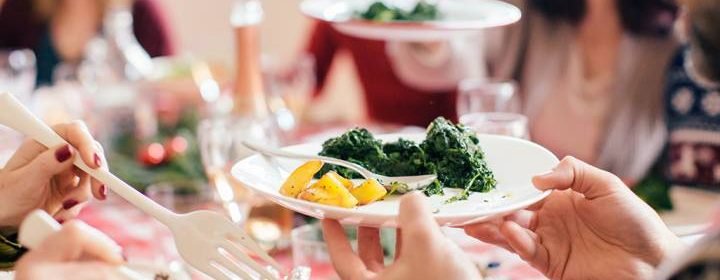How much weight do you actually gain over the holidays?

There’s a common belief that on top of excessive gift giving and family gatherings, the holidays also bring weight gain.
While it’s true you may enjoy richer foods and more sweets than usual, experts say you shouldn’t be too concerned with packing on pounds.
“Indulging in the holiday spirit over two to three weeks may have you gaining a pound or two,” said Abby Langer, a Toronto-based registered dietitian.
“But moderating intake and choosing your favourite foods rather than using the holidays as an excuse for going all out every day can keep added weight off.”
Why we gain weight
Research backs up Langer’s one to two pound mark.
According to a study published in the New England Journal of Medicine, the average holiday weight gain is around one pound — much less than the assumed five.
The study, which followed men and women of varying body sizes, found that fewer than 10 per cent of subjects actually gained five pounds.
Researchers also concluded that many people don’t lose their holiday pound, which likely contributes “to the increase in body weight that frequently occurs during adulthood.”
“It’s very normal to gain some weight over the holiday season because you’re [likely] eating more, which is not an everyday thing,” said Gail Kardish, a Toronto-based registered dietitian. “I think that scares people because they want to be able to eat, but don’t want their bodies to change.”
How to eat mindfully over the holidays
If you’re trying to maintain your weight and watch how much you indulge over the season, “there’s a few really simple strategies to put in place,” said Jessica Schatz, an L.A-based fitness expert and founder of Champion Pilates.
If you’re going to an event in the evening, Schatz said it’s important not to fast in the day. While you may think skipping meals means “saving room” for tasty appetizers, you’re more likely to overeat if you’re hungry.
If you’re heading to a sit-down dinner, Schatz said you should drink a full glass of water before you eat a meal. Not only does water help keep you hydrated, it also helps your body better digest food, she said.
When it comes to meal time, Schatz said what you put on your plate matters.
“I always tell people you want to fill your plate up with as many vegetables as you can, and that’s what you want to eat first,” she said. “Fill up on the vegetables before you get into the other stuff.”
Schatz suggests putting your fork down in between bites so your body has a chance to process the food. It takes a bit of time for your brain to know you’re full, so eating slowly helps. Plus, “when you put your fork down, you’re savouring your food and enjoying it more,” she added.
When you’re finished your meal, Schatz said it’s good to leave your plate empty for 10 minutes before you go back for seconds. That way, you’re giving your body time to digest and figure out if you’re actually still hungry.
“During that 10 minutes and in between each bite, enjoy the people you’re with. This is a time we get to see people we don’t always get to see.”
It’s OK to have a treat
Schatz said it’s also important to acknowledge that you’re probably going to indulge a bit — and that’s a good thing. The holidays are meant to be enjoyable, after all.
“You can really have your [favourite things], it’s just about being smart and what you do afterwards,” she said. “Eat what you want to eat — mindfully — and stop when you’re full, and you’re going to be OK.”
Langer echoes this stance. “It’s a festive time of year … and most of us indulge in incredible food, but that doesn’t mean we need to consume to the point of feeling like we’re overly full,” she said.
But if you do go overboard? Don’t beat yourself up and get back to your regular routine.
“One or two large meals or days where you overeat aren’t going to make or break anything about your body or diet,” Langer said. “Go back to your normal eating habits the new year, and try to keep things as sustainable as possible.”
Source: Read Full Article

